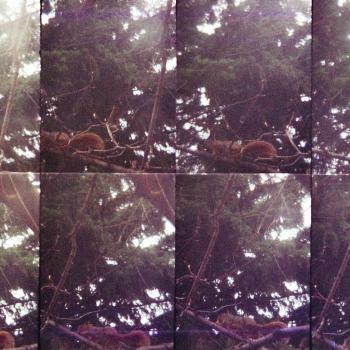 Train up a child in the way he should go. Even when he is old he will not depart from it. —Proverbs 22:6
Train up a child in the way he should go. Even when he is old he will not depart from it. —Proverbs 22:6
During our first year of marriage, Becki and I babysat to prepare ourselves for the perils of parenthood. Nothing could have prepared us, however, for teaching someone else’s children the meaning of the word “turd.”
When we chose to screen Richard Donner’s 1985 film, Goonies, for ten-year-old Emily and her six-year-old brother, Trevor, we thought we were standing on solid ground. It was rated PG, after all. Most of the Goonies were children, Emily and Trevor were children, and Becki and I first saw the film as children. How could we go wrong?
Midway through the film, however, a boy named Chunk calls a boy named Mouth a “turd.” At this point, Emily and Trevor became quite inquisitive.
“What does turd mean, Chad?” they asked in unison.
On one hand, I was born to answer this question. I studied scatology under the “toot-elage” of Professor von Krapp at Dudu University in Fährtenblätz, so I am something of an expert on the subject. On the other hand, I wondered if Emily and Trevor’s parents, who trained their children in the ways they should go with regard to the bathroom, would also want to instruct them about appropriate language for referring to their goings.
My father first tickled my tympanic membrane with “turd” when I was five years old. While doing his duty to address the doozy of a doody in my sister Alyssa’s diaper, he looked at her with fatherly affection and said, “You’re just a little turd, aren’t you?”
I asked him what this strange word meant. Shortly after he enlightened me, I began chanting that word as a monk might a Latin prayer.
Would Emily and Trevor love this word as much as I had? Would they become scatological opportunists like I did, seamlessly slipping bathroom banter into any conversation they could, simply because it amused them?
Of course, I knew parenthood would involve fielding questions far dicier than “What does turd mean, Chad?” Furthermore, if I did not teach Emily and Trevor the meaning of this word, someone far less qualified than I would. With barely concealed delight, I enlightened the children. I hoped their parents, Anne and Kelly, would not mind.
Becki backed my decision to educate Emily and Trevor. When we were first dating, she specialized in gastroenterology in her physician assistant work. Feces were a matter of fact for her.
“Turd?” Trevor inquired, as if this utterance were a question capable of being encapsulated in one word like “What?” or “Why?”
“You got it, Trevor,” I replied. “Turd.”
He repeated the word with great care, as if he were trying on a pair of sneakers for the first time. After a moment of silence, he used it in a sentence.
“I made a turd today, Chad,” he said, laughing.
Emily blushed. As embarrassment gave way to a smile, it became apparent that she, too, was champing at the bit to use the word.
We returned to the film, neither encouraging the children to use this new word nor discouraging them from it. Thinking the worst of Goonies was behind us, we winced when one of the characters mentioned One-Eyed Willie—the pirate whose lost treasure is the movie’s MacGuffin. As children, we knew the pirate had only one eye, but the double entendre eluded us completely. We could only hope it would soar with similar stealth over Emily and Trevor’s heads.
If it did not, would they ask us why he was named One-Eyed Willie? Would we have no other choice but to explain that his name was a reference to the male organ? Or would we deflect the question by turning the tables on them, asking them a question like, “Well, why are your names Emily and Trevor?”
The question never came.
Before our daughter Evie entered the picture in October 2011, our time with Emily and Trevor served as a preview of parenthood. I know I will someday tell Evie what a turd is, and I will probably treasure that moment even more than I delighted in imparting scatological understanding to Emily and Trevor.
In training up Evie in the way she should go, however, I am certain Becki and I will encounter questions that do not have easy answers. We will do our best to answer questions about sex, death, politics, and God, among other things, and I suspect we will feel absolutely inept as we attempt to do so.
In those moments, we will wish Evie’s questions were as simple as, “Why is that pirate named One-Eyed Willie?” We can only hope and pray that we will be ready to respond to Evie’s questions with candor, and that our words will be tempered with the hope we hold in Jesus Christ.
At the moment, I am thankful that Evie, who still says “tat” instead of “cat,” is a long way from learning the word turd. Becki and I have not even potty-trained her, let alone trained her in the way she should go with regard to words that might make her a potty-mouth.
One thing at a time, I suppose.
When Emily and Trevor’s parents picked them up that night, we apologized for teaching their children a word they would never want to unlearn. Anne and Kelly laughed when we told them about the evening’s English lesson. Anne even corrected Emily after she used the word incorrectly in a sentence.
“I turded today,” Emily said, her cheeks flushing.
“It’s not a verb, Emily,” her mother explained. “It’s a noun.”
When I change Evie’s diaper now, I sometimes say the same words my father said to my sister Alyssa all those years ago: “You’re just a little turd, aren’t you?” I know that someday she will try that word on like a new pair of shoes, and she will smile.
Note: This post is excerpted from Chad’s forthcoming e-book, Nightmarriage. Pre-order the book here now at 20% off and receive a free audio version when it becomes available.











